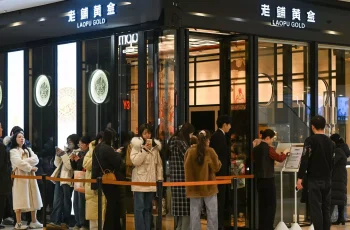In a recent roundtable gathering, Chinese President Xi Jinping took center stage, making a fervent appeal to global business leaders to invest in China’s burgeoning market. The backdrop for this call was a complex web of increasing trade tensions with the United States, a situation which has seen U.S. tariffs on Chinese goods spike dramatically. What’s truly fascinating is how Xi’s approach appears to merge an idealistic vision of global cooperation with a pragmatic acknowledgment of China’s current economic challenges. Here lies an inherent contradiction, suggesting that while the world navigates a tumultuous political landscape, China seeks to position itself as an indispensable global player.

While one would expect these overtures to be cloaked in persuasion, Xi’s assertion that multinational companies have a duty to “uphold global order” serves a dual purpose. It not only urges foreign investments but also frames China as a stabilizing force in a disordered world—an interesting characterization when one considers the ongoing allegations surrounding its trade practices and human rights record.
A Dual Strategy: Attraction and Acquiescence
During the roundtable, Xi made an emotive statement: “To invest in China is to invest in tomorrow.” This statement transcends a mere marketing ploy and reflects a deliberate pivot in strategy, aiming to allure Western corporations amid threats of decoupling. By guaranteeing fair opportunities in government procurement, China is not just pitching itself as a viable market but is also self-promoting as an exemplar of fairness.
However, one cannot overlook the underlying context. The partiality evinced during his discussions—focusing on U.S. businesses like Blackstone and Standard Chartered—may indicate a fear of isolation. Xi called for negotiations to resolve U.S.-China trade tensions, insinuating that China recognizes the unavoidable interdependence that exists, yet his call for cooperation appears more as a strategic facade given the simmering hostilities underneath.
Politically Motivated Engagements
The meeting, attended by global heavyweights including Ray Dalio and Bill Winters, seems to signal a contrived effort to showcase Beijing’s camaraderie with the business elite, particularly at a time when the trade landscape looks increasingly hostile. The presence of prominent political figures like Cai Qi and Wang Yi suggests a well-orchestrated plan designed to entrench these discussions within a political framework. The interplay between business and politics in this environment shows the lengths to which Beijing is willing to go to maintain relevance amidst diplomatic spats.
Interestingly, though, Xi’s outreach contrasts sharply with the U.S. action towards Chinese firms. The Trump administration’s increasing use of protectionist measures and export blacklists creates an environment rife with uncertainty, making Xi’s allure ring with an ironic timbre. If engaging with the global market is truly the priority, can China genuinely adopt a cooperative stance when it employs tactics that seem overtly retaliatory and antagonistic?
Mainstream Morality vs. Pragmatic Interests
While Xi champions global order and stability, the reality is much more nuanced.
The notion that “no one can gain from a trade war” is the simplistic balm of a leader hoping to soothe both domestic and foreign audiences. In practice, trade wars often yield winners and losers, and at this stage, it is clear that China’s economic position is far more vulnerable than its rhetoric suggests. This stark juxtaposition forces one to question the sincerity of Xi’s proposals: Are these calls genuine invitations to collaborate, or merely calculated moves to counterbalance the pressures exerted by the U.S.?

By courting foreign executives while facing increasing criticism on the global stage, Xi demonstrates a willingness to adapt—however, that adaptation is steeped in self-interest, a trait not uncommon in geopolitics. As foreign leaders grapple with the challenges posed by their government’s relations with China, the dilemma of engagement versus isolation remains a daunting question. The emerging narrative suggests that for many corporations, savvy navigation through this tumultuous political arena requires more than a diplomatic handshake; it demands an acute understanding of the moral implications of such entanglements. As the dust thins over these discussions, the long-term consequences of Xi’s overtures will inevitably shape the future of global trade and economics.

